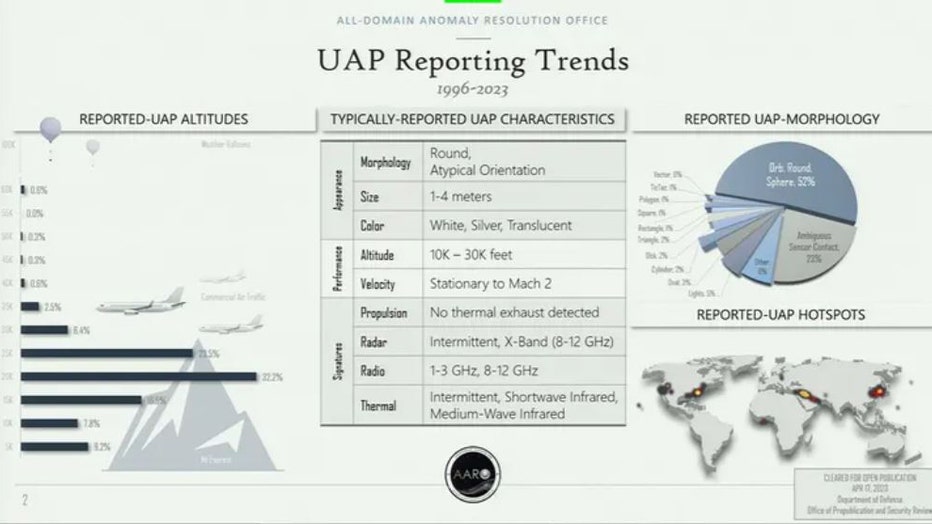NASA reveals latest weapon to 'search the heavens' for UFOs, aliens
The members of NASA's UAP (unidentified anomalous phenomena) study. (NASA)
Artificial intelligence and machine learning will be "essential" to finding and proving the existence of extraterrestrial life and UFOs, NASA said.
The space agency recently released its highly anticipated 36-page UFO report that said NASA doesn't have enough high-quality data to make a "definitive, scientific conclusion" about the origin of UFOs.
Moving forward, AI will be vital to pinpointing anomalies while combing through large datasets, according to the report compiled by NASA's independent research team on UAPs (unidentified anomalous phenomena), a fancy word for UFO.
"We will use AI and machine learning to search the skies for anomalies… and will continue to search the heavens for habitable reality," NASA Administrator Bill Nelson said during a Sept. 14 briefing. "AI is just coming on the scene to be explored in all areas, so why should we limit any technological tool in analyzing, using data that we have?"
NASA CAN'T EXPLAIN ‘HANDFUL’ OF UFO SIGHTINGS AS IT SEARCHS FOR ‘SIGNS OF LIFE’
Dr. Nicola Fox, NASA's associate administrator, elaborated on Nelson's point, saying AI "is an amazing tool" to find "signatures that are sort of buried in data."

UAP reporting trends presented during April 19, 2023, Senate hearing. (U.S. Senate Committee on Armed Services)
That's how NASA, and scientists around the world, are going to be able to find the metaphorical needle in a haystack, Fox said.
WHAT IS ARTIFICIAL INTELLIGENCE (AI)?
"So a lot of our data are just sort of wiggly line plots. We get excited about wiggly line plots, by the way, but sometimes, you see the wiggles, but you miss a signal," she said.
"By using artificial intelligence, we can often find signatures. So one example we've had is to be able to find signatures of superstorms using very old data that, you know, really is before sort of like routine scientific satellite data."
Using AI was a key component of the 16-member, independent UAP research team's report.
"The panel finds that sophisticated data analysis techniques, including artificial intelligence and machine learning, must be used in a comprehensive UAP detection campaign when coupled with systematic data gathering and robust curation," the report says.
UFO ‘HOTSPOTS’ MAP REVEALS CLUSTER OF SIGHTINGS LINKED TO ATOM BOMBS, WAR ZONES
The use of AI has been a controversial topic that governments around the world, including the U.S., are grappling with.
Advocates have lauded the potential capabilities of generative AI and the possibility it could catapult society to the next evolution of humankind. On the flip side, it can also create a dystopian future if guardrails aren't put in place, or if it's in the hands of ill-intended users, experts have warned.
Earlier this month, over 100 members of Congress met with big tech tycoons such as Elon Musk and Mark Zuckerberg about AI, and some senators expressed concern about unregulated AI.
The NASA panel was asked if regulating AI would impact the space agency's ability to use the budding technology to potentially find extraterrestrial life.
Nelson brushed off concerns that regulations would hamper NASA's mission.
"No, don't think that any attempts to that the Congress has underway to try to write a law that would appropriately put guardrails around AI for other reasons is anyway going to inhibit us from utilizing the tools of AI to help us in our quest on this specific issue," Nelson said in response to the question.
READ NASA'S FULL SEPT. 14 REPORT
NASA's study of UAPs is separate from the Pentagon's investigation through the All-domain Anomaly Resolution Office (AARO), although the two investigations are running on parallel tracks that include corroborative efforts.
Much like a team of peer reviewers, NASA commissions independent study teams as a formal part of NASA’s scientific process, and such teams provide the agency external counsel and an increased network of perspectives from scientific experts.
They were assigned to pinpoint the data available around UAP and produce a report that outlines a roadmap for how NASA can use its tools of science to obtain usable data to evaluate and provide suggestions moving forward.
Get the latest updates on this story at FOXWeather.com
Chris Eberhart is a crime and US news reporter for Fox News Digital. Email tips to chris.eberhart@fox.com or on Twitter @ChrisEberhart48.

